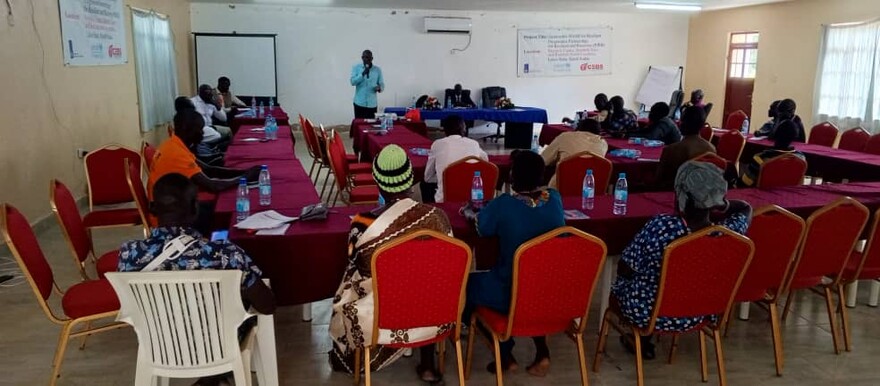The Center for Emergency and Development Support (CEDS), in collaboration with the Lakes State Ministry of Housing, supported by UNICEF through the Netherlands Embassy in Juba, has inaugurated the third phase of a sustainable WASH project.
The initiative is designed to focus on resilience and recovery across three counties in Rumbek: Rumbek Center, Rumbek East, and Rumbek North.
The initiative’s official launch took place at Rumbek’s Palm Tree Hotel on Wednesday, attended by more than 30 participants.
David Ayuen Mawel, CEDS WASH Engineer and sub-cluster WASH Coordinator for Lakes State said: “We previously implemented phases 1 and 2, and this is now a phase 3 and phase 3 will run for one year from July this year to July 2024.”
He elaborated on the project’s scope, stating, “What we are going to implement in that project is a rehabilitation of 64 boreholes and then we are going to rehabilitate six (6) water yards in Rumbek North that completely broke down and are not functional. On the side of sanitation, we are going to trigger 30 villages compared to what we did last year, where we triggered 50 villages and now it has reduced to 30 villages because of funding shortages.”
In relation to hygiene promotion, he added, “We are going to train school health clubs and we are going to be doing some campaign on hygiene and then train Parents Teachers Associations (PTAs) in the schools and strengthening institutions such as a database in the concerned ministries and developing the capacity of government personnel concerned with rural water development.”
Highlighting the funding challenges, Mawel expressed concern, stating, “Funds are becoming a big issue, and that’s why we are still targeting the three counties and up to this far we really begged for the sustainability of what we are going to do and what we have done previously… My main message to the people is that they must ensure the sustainability of the rehabilitated boreholes. That is their responsibility as project beneficiaries.”
Barnaba Makuac Magol, Director of Water for Lakes State Ministry of Housing, emphasized the community’s role in sustaining the project’s outcomes.
“Already the community themselves have accepted to collect water tariffs… The water ministry at the national and the state ministry of Housing, Lands and Public Utilities, particularly the directorate of water, will be able to monitor how the tariffs have been collected and how they are being used. This will help to get correct accountability from the community such that the community can be able to sustain their own boreholes,” he said.
While acknowledging the support of development partners like UNICEF and the Netherlands embassy, Magol urged for extended assistance for areas affected by conflict, noting, “funding institutions like the Netherlands embassy in South Sudan should reconsider giving an extension for the implementation of the phase three WASH program, especially in areas in the counties that were devastated by conflict.”
Poth Majak Daljang, Lakes State Minister for Agriculture, Environment, and Forestry, highlighted the need for increased community engagement.
“We cannot allow aid organizations to continue repairing old boreholes. The cycle of repairing boreholes must stop… So there will be another meeting where local government is there and also representatives of chiefs so that we frankly tell them to take over the sustainability and that they own these assets,” he said.




